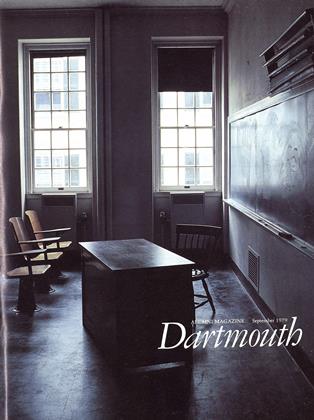When Playboy photographer David Chan turned up in Hanover last winter to solicit student models to appear in a feature about "Girls of the Ivy League," his presence here, as well as at other Ivy schools, engendered a spirited controversy. There was considerable discussion about the morality of his venture and the mentality of the women who would take him up on his offer, a spate of angry letters to The Dartmouth (which ran Chan's advertisement, as opposed to the Harvard Crimson, which did not) about freedom of the press and exploitation of women, a few testy telephone calls to Chan's room at the Hanover Inn, and inquiries about making arrangements to pose. When the back-to- school September issue — with the title of its cover story changed to read "Women of the Ivy League" — hit the stands at the Dartmouth Bookstore early in August, it sold a normal month's order of 175 copies on the first day.
We talked to the bookstore manager, David Cioffi, about how the issue had been received. He said that the store sold another 175 copies on the second day and that he had so far ordered a total of 800 copies to keep up with the demand. He added that he plans to keep the issue in stock for students arriving in Hanover for fall term and that arrangements had been made with the distributor to obtain any unsold copies returned from other outlets. "The price is up from $2.00 to $2.50 this issue," Cioffi pointed out, "but it doesn't seem to be affecting sales in the least. I don't think the students even noticed the price increase." Students aren't the only ones buying copies. Professors have been seen browsing through the pages checking to see if they recognized any faces.
Two of the three Dartmouth women who appear in the article, Suzanne Baldwin 'BO and Carrie Margolin, a graduate student in psychology, were recently interviewed by the local television station and also showed up at the bookstore to autograph their photographs. The third model, Sharon Cowan, a Russian major who told Playboy her ambition is to be a Moscow correspondent for the New York Times, graduated in June. Cioffi said the women "seem to be handling this all very well. They're not taking it too seriously." He also noted the store has received no complaints about having the issue on the shelves. In an interview with The Dartmouth, Baldwin pointed out that student reaction to the photographs has been anti-climatic. "Students don't care too much," she said. "It's just a picture."
The Playboy article claims to be an attempt to dispel the notion that "Ivy League women are brilliant but rarely bountiful." Given that modest ambition, the story and pictures faithfully follow the usual pattern of Playboy photographic essays. The Dartmouth "Playmates" professed to be disappointed by the superficial quality of the article but generally pleased by their photographs. Cowan appeared clad in a pair of Dartmouth green stockings and was described as hard at work on her first novel. Baldwin said she agreed to a semi-nude reclining pose "because I like the way I look." Margolin was photographed standing in the snow wearing an unbuttoned wool shirt. She claimed that nude portraits are "a tradition in my family."
The real flap at the College had nothing to do with pictures in the magazine but with a 20-second Playboy television commercial. The ad shows two fraternity men — of the slovenly variety popularized by the movie Animal House — looking at the "Women of the Ivy League" article. One of the students exclaims over the looks of a model from Dartmouth and says he'd like to transfer there. His friend tells him they already attend Dartmouth. The College contacted Playboy and objected to the ad, requesting it be taken off the air or that references to Dartmouth be deleted. Playboy, in turn, announced that Dartmouth was threatening legal action. The College then condemned Playboy for "stirring up controversy" for publicity purposes. The spat was duly reported in the national press, and the commercial appeared in major cities except for Boston, where some alumni convinced television station WCVB to take the ad off the air.
 View Full Issue
View Full Issue
More From This Issue
-
 Feature
FeatureUps and Downs in the Big Leagues
September 1979 By Keith Bellows -
 Feature
FeatureTemples, Turtles and Fat Boys
September 1979 By Dan Nelson -
 Feature
FeatureThe Kids Danced
September 1979 By Robert Feakins -
 Article
ArticleThe Bard's American Friend
September 1979 By Michael Colacchio '80 -
 Class Notes
Class Notes1954
September 1979 By JOHN L. GILLESPIE, Fred Alpert '54 -
 Class Notes
Class Notes1974
September 1979 By WILLIAM B. CATER JR.
Article
-
 Article
ArticleMaladies
APRIL 1932 -
 Article
Article1951 Is Living Up to Expectations
March 1948 -
 Article
ArticleTwo Alumni Awards Conferred
JUNE 1972 -
 Article
ArticleJames Rudolph's paper clock: an idea whose time has come
JUNE/JULY 1984 -
 Article
ArticleNewsmakers
Mar/Apr 2005 By BONNIE BARBER -
 Article
ArticleGUIDE TO THE OUT O’ DOORS
NOVEMBER 1992 By Tig Tillinghast ’93


